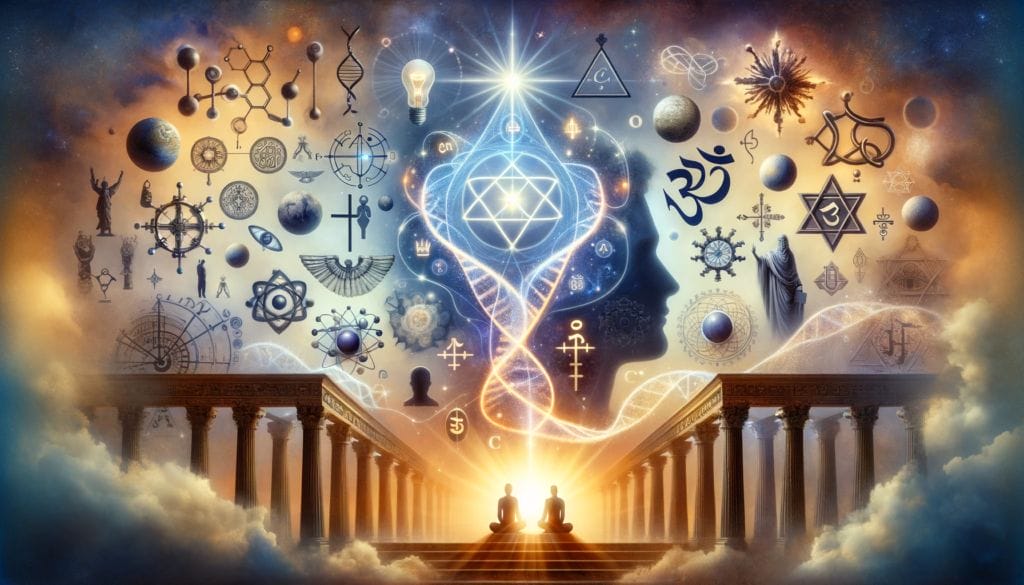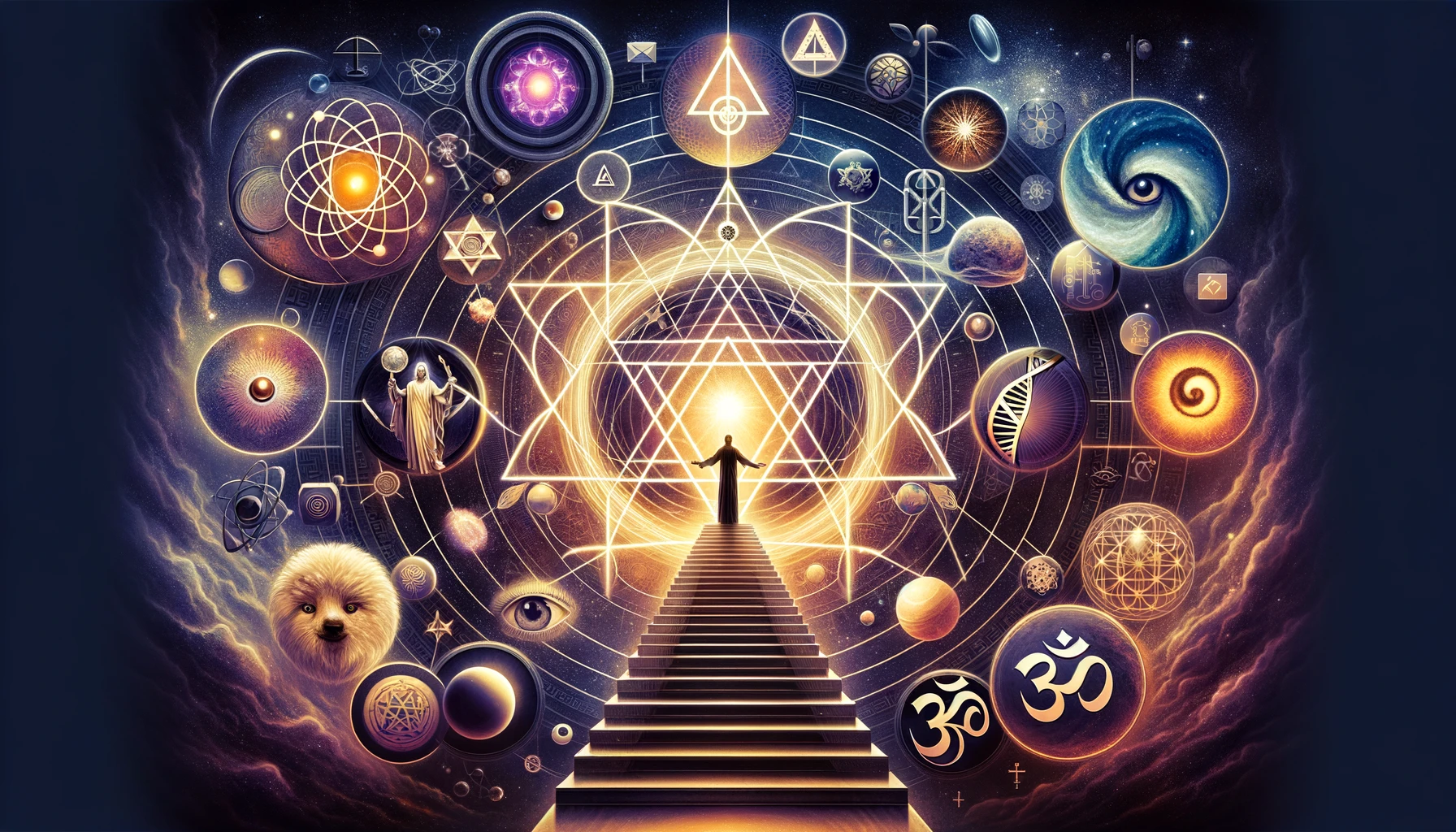Theosophy Definition: Exploring Core Principles
In your journey to understand the Theosophy definition, you’ll delve into its core principles, which encompass the quest for truth, the pursuit of self-knowledge, and the complex laws that oversee the universe. This exploration goes beyond typical spiritual ideas, offering a unique blend of mystical depth and practical application.
Key Takeaways
- Theosophy is a spiritual philosophy that explores a deeper spiritual reality and offers insights into the mysteries of life and the existence of an unseen universe.
- Theosophy emphasizes universal brotherhood, the study of laws of nature, and human spiritual evolution.
- Theosophy incorporates the concepts of karma and reincarnation for understanding life’s journey.
- Theosophy encourages active engagement with its ideas through comparative religious study.
Theosophy Definition
At its core, Theosophy is an esoteric framework that blends scientific inquiry, philosophical thought, and religious traditions to uncover the deeper truths of existence.
The definition of Theosophy hinges on this unique synthesis, aiming to bridge the gap between material and spiritual understanding. As you delve into Theosophy, you’ll encounter a rich tapestry of theosophical concepts designed to expand your consciousness and foster a profound connection with the universe.
The exploration of core principles within Theosophy reveals an emphasis on universal brotherhood, the study of laws of nature, and the potential for human spiritual evolution. It’s a tradition that doesn’t just ask you to believe; it encourages you to actively engage with its ideas through comparative religious study, reflecting on teachings from various world religions to discern their underlying unity.
Key to Theosophical thought are the concepts of karma and reincarnation—principles suggesting that your actions have consequences that carry over lifetimes, molding your soul’s journey. This perspective provides you with a framework for understanding life’s trials and triumphs as opportunities for learning and growth.
In essence, Theosophy isn’t just a belief system. It’s a quest for wisdom that transcends the boundaries of conventional thought, inviting you to look inward and explore the mysteries of existence.
Introduction to Theosophy
Theosophy is a spiritual philosophy that proclaims a deeper spiritual reality and encourages exploration of the divine through its core principles.
Theosophy isn’t just a belief system but also a framework for understanding the unseen universe and its intricate workings. It’s a comparative study, drawing from the world’s religions, sciences, and philosophies to reveal a harmonious synthesis of wisdom.
Understanding the key concepts of Theosophy is crucial for grasping its essence. These principles offer insights into the mysteries of life and the cosmos, suggesting that there’s much more beyond the material world. Theosophy posits that an unseen universe exists, interwoven with our own, and it’s accessible through spiritual development and inner transformation.

The modern influence of Theosophy can be seen in various aspects of contemporary spirituality and new age thought. It has inspired individuals to seek unity in diversity, understand the interconnectedness of all life, and strive for personal enlightenment.
As you continue this journey, remember that Theosophy isn’t merely historical; its teachings remain relevant, offering guidance for those seeking to comprehend the deeper truths of existence.
Historical Background
Emerging in the 19th century, Theosophy traces its roots to the collaborative efforts of Helena Blavatsky, Henry Steel Olcott, and William Q. Judge. These key founders ignited the historical origins of a movement that sought to unveil the esoteric truths underlying world religions and philosophies.
You’re delving into a rich tapestry of spiritual exploration, where the early development of Theosophy aimed to forge a universal brotherhood without distinction of race, creed, sex, caste, or color.
The evolution over time of Theosophy has seen its share of challenges and transformations, drawing from various religious and philosophical traditions. Influential figures within the movement helped shape its doctrines and practices, ensuring Theosophy’s continued relevance and adaptation to the changing spiritual landscape.
This table highlights the cornerstones laid by these pioneers, encapsulating the essence of Theosophy’s formative years.
| Key Founder | Contribution | Impact |
|---|---|---|
| Helena Blavatsky | Writings and teachings | Established core doctrines |
| Henry Steel Olcott | Organizational leadership | Expanded global reach |
| William Q. Judge | Dissemination in the Western world | Popularized Theosophy |
Core Principles of Theosophy
Delving into the core principles of Theosophy, you’ll discover a foundational belief in the innate unity of all life, a concept that underpins the movement’s spiritual philosophy. This unity is not just a philosophical abstract but a living truth that influences every aspect of Theosophy, guiding its practices and teachings.
As you explore further, you’ll come to understand the importance of esoteric philosophy, which serves as a map for navigating the hidden dimensions of existence.
Theosophy emphasizes the significance of spiritual evolution, a process through which you can ascend to higher states of consciousness and closer to divine wisdom. This wisdom isn’t reserved for a select few; it’s thought to be accessible to anyone who earnestly seeks it through study and mystical practices.
Occult science, another key element, offers tools to explore the mysteries of life and the universe. Here’s a snapshot of these interconnected principles:
| Principle | Description | Application |
|---|---|---|
| Unity of All Life | Belief in the interconnectedness of existence | Promotes compassion and understanding |
| Spiritual Evolution | Process of inner development | Encourages personal growth and enlightenment |
| Occult Science | Study of hidden laws of nature | Used for deepening insight into life’s mysteries |
Embrace these core principles, and you’re on your way to uncovering a deeper reality that Theosophy promises.
The Three Fundamental Propositions
Three fundamental propositions of Theosophy provide a foundation for its philosophy. They encompass the concept of Universal Brotherhood, the importance of comparing world religions, and the investigation into the unseen parts of the universe.
Let’s examine how each underpins the Theosophical belief system and influences its practices.
1. Universal Brotherhood
The concept of Universal Brotherhood is a cornerstone of Theosophical philosophy, positing that all life is fundamentally interconnected. You’re encouraged to view yourself as an integral part of a vast, living cosmos, participating in a shared existence with every creature. This isn’t just a lofty ideal but a call to live with a deep sense of:
- Mystical Unity: Recognizing the spiritual oneness that binds all beings.
- Esoteric Philanthropy: Engaging in selfless giving that stems from an understanding of hidden truths.
- Humanitarian Service: Offering aid and advocating for the welfare of all, transcending boundaries.
- Compassionate Action: Acting with empathy and kindness towards every form of life.
Through these practices, you foster spiritual solidarity, contributing to the collective evolution of consciousness.
2. Comparative Study of World Religions
In exploring the vast landscape of world religions, Theosophy’s Three Fundamental Propositions serve as a unifying framework, revealing core similarities beneath diverse spiritual traditions.
You’ll discover the notion of religious syncretism, which acknowledges how spiritual traditions integrate, suggesting a shared divine wisdom at their heart.
As you delve into esoteric practices across different faiths, you’ll see they often aim to foster spiritual evolution, guiding followers towards enlightenment and mystical experiences.
These propositions encourage you to look beyond exoteric rituals to the esoteric core, where the pursuit of truth transcends doctrinal differences.
3. Exploration of the Unseen Universe
The third Theosophy proposition takes us on an exciting adventure beyond what we can see and touch, into a hidden universe full of mysteries. This part of our journey is about discovering the secret forces that shape our world and the hidden parts of the cosmos.
We’re looking into special Theosophical ideas that say there’s much more to life than what meets the eye.
- Oneness of All Life: The notion that everything in the universe is spiritually interconnected, an idea rooted in esoteric cosmology.
- Law of Cycles: This principle reflects the belief in spiritual evolution, where all beings progress through reincarnation and karma.
- Hierarchy of Existence: A concept suggesting a structured cosmos, where occult sciences and mystical practices uncover deeper truths.
- Knowledge Through Exploration: The Theosophical tradition encourages clairvoyant research to directly perceive and understand the mysteries of the unseen world.
Key Theosophical Concepts
You’ve touched on the foundational beliefs; now let’s turn your attention to the specific concepts that give Theosophy its unique character.
Karma and Reincarnation
Karma and reincarnation are foundational concepts in Theosophy, shaping the belief that your actions determine your future existences.

You’re entangled in karmic cycles that reflect your moral responsibility and influence your spiritual evolution. Understanding causality’s ethical implications helps you grasp the depth of these teachings.
Here’s a breakdown to deepen your understanding:
- Karmic Cycles: Your actions generate consequences that come back to you, fostering a continuous cycle of cause and effect.
- Ethical Implications: Every decision you make carries a moral weight that impacts your karmic balance.
- Spiritual Evolution: Through successive lifetimes, you evolve spiritually by learning lessons and resolving past karmas.
- Moral Responsibility: You’re encouraged to live ethically, knowing your actions contribute to your soul’s journey and the well-being of all.
The Sevenfold Nature of Man
In Theosophy, the sevenfold nature of man is a fundamental concept that delineates the complex layers of human existence, ranging from the physical to the purely spiritual.
You’re not just your body or mind; you’re a multi-dimensional being on a journey of spiritual evolution.
Your esoteric anatomy comprises seven aspects, including your physical form, the astral body, and aura layers that interact with the chakra system. Each layer represents a step closer to your true spiritual essence.
As you learn more about these teachings, you’ll discover how the physical plane is just the starting point. It’s your astral body that navigates dreams and the subtler realms, powered by the chakras, guiding you through life’s mysteries towards ultimate enlightenment.
The Hierarchies of Spiritual Beings
Building on the understanding of the sevenfold nature, Theosophy also reveals a complex hierarchy of spiritual beings that influence our journey toward enlightenment. These entities exist within cosmic hierarchies, each with their own role in the grand tapestry of existence. Here’s a glimpse of what you’ll encounter:
- Elemental Beings: These are the spirits of nature, fundamental to the world’s structure and your personal spiritual evolution.
- Angelic Orders: Often seen as messengers or guardians, they’re integral to maintaining cosmic balance.
- Ascended Masters: These are enlightened individuals who’ve transcended physical limits, offering guidance to humanity.
- Cosmic Hierarchies: These are vast and ordered realms of spiritual beings, overseeing the universe’s evolutionary plan.
Together, they form a ladder of spiritual progression, beckoning you ever upward.
Theosophy’s Influence
Theosophy has profoundly shaped various spiritual and cultural movements, deeply influencing modern esoteric thought. Its influence on spirituality is undeniable, having introduced a complex framework for understanding the metaphysical realm.
Theosophical impact isn’t confined to esoteric circles; it’s been a catalyst for cultural movements that explore the unseen universe, encouraging a departure from materialistic views.
You’ll find that modern esoteric thought owes a great deal to Theosophy’s synthesis of spiritual traditions. It’s fostered an appreciation for mystical experiences and the belief in a universal truth underlying all religions.
Theosophy’s emphasis on personal spiritual development and the exploration of hidden dimensions of life has resonated with individuals seeking to transcend the mundane.
As you delve deeper, you’ll see how Theosophy has inspired artists, writers, and thinkers, influencing their work and helping to shape cultural narratives that reflect an interest in the mystical and the esoteric.
It’s this theosophical impact that has helped bridge the gap between science and spirituality, offering a unique perspective on the interconnectedness of all life. Through its enduring presence, Theosophy continues to invite seekers to consider the profound mysteries of existence.
Modern Theosophy
As we venture into the present, the Theosophical Society continues to evolve, adapting its teachings and practices to resonate with the spiritual seekers of today.
Modern Theosophy isn’t just a relic of the past; it finds new life through contemporary interpretations that align with current spiritual and philosophical discourse.
The core principles of Theosophy now manifest in various modern applications, influencing not only individual mystical experiences but also contributing to a collective understanding of spirituality.
Consider the following aspects of Modern Theosophy:
- Philosophical implications: Theosophy offers a unique perspective on metaphysical questions, influencing modern thought on consciousness, cosmology, and the nature of reality.
- Mystical experiences: Theosophy encourages exploration of the transcendent, facilitating personal experiences that challenge and expand one’s spiritual horizons.
- Practical applications: Theosophical concepts are applied in daily life to promote spiritual development, ethical living, and a harmonious existence with all beings.
- Contemporary interpretations: Modern Theosophists interpret age-old teachings in the context of current scientific understandings, making Theosophy relevant in an age of quantum mechanics and neuroscience.
In Simple Terms…
Theosophy is like an ancient map of spiritual knowledge that helps us understand life’s big questions. It combines old wisdom with new ideas to show us how everything in the universe is connected.
You’ve taken a peek into this fascinating world, learning about its basic beliefs and how it has touched people’s lives throughout history. You’ve also thought about some pretty deep stuff, like the soul’s journey and the hidden parts of our world.
Now, as you think about all of this, you might wonder how these ideas fit into your own life. Could Theosophy shed light on your path and help you make sense of the world?
Is it possible that this age-old wisdom holds the keys to the secrets you’re looking to unlock? Why not dive deeper and see where Theosophy’s path might lead you?


